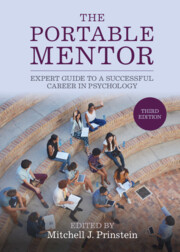Book contents
- The Portable Mentor
- The Portable Mentor
- Copyright page
- Dedication
- Contents
- Figures
- Tables
- Boxes
- Contributors
- Preface
- Acknowledgments
- Part I Applying to Graduate School
- Part II Beginning your Career
- Part III Your Research/Academic Career
- Part IV Your Career as a Practitioner
- Part V Your Professional Service Career
- 21 Getting Involved in Professional Organizations: A Gateway to Career Advancement
- 22 Advocacy: Advancing Psychology and Public Well-Being
- 23 Public Education of Psychology: An Interview with Philip G. Zimbardo, PhD
- 24 Working with the Media – and Getting the Media to Work for You
- Part VI Your Career After Graduate School
- Index
- References
22 - Advocacy: Advancing Psychology and Public Well-Being
from Part V - Your Professional Service Career
Published online by Cambridge University Press: 21 July 2022
- The Portable Mentor
- The Portable Mentor
- Copyright page
- Dedication
- Contents
- Figures
- Tables
- Boxes
- Contributors
- Preface
- Acknowledgments
- Part I Applying to Graduate School
- Part II Beginning your Career
- Part III Your Research/Academic Career
- Part IV Your Career as a Practitioner
- Part V Your Professional Service Career
- 21 Getting Involved in Professional Organizations: A Gateway to Career Advancement
- 22 Advocacy: Advancing Psychology and Public Well-Being
- 23 Public Education of Psychology: An Interview with Philip G. Zimbardo, PhD
- 24 Working with the Media – and Getting the Media to Work for You
- Part VI Your Career After Graduate School
- Index
- References
Summary
In the rapidly changing context of twenty-first-century psychology, graduate students and early career professionals have many options for career development.While membership in professional associations has historically been an unquestioned step to career development, that is no longer true.So, should professionals still join membership organizations?The authors make the case that psychological organizations foster personal and professional development, professional networking, and opportunities to serve the discipline and society.The authors provide multiple examples of opportunities and benefits of membership, with several examples included.
- Type
- Chapter
- Information
- The Portable MentorExpert Guide to a Successful Career in Psychology, pp. 406 - 416Publisher: Cambridge University PressPrint publication year: 2022



